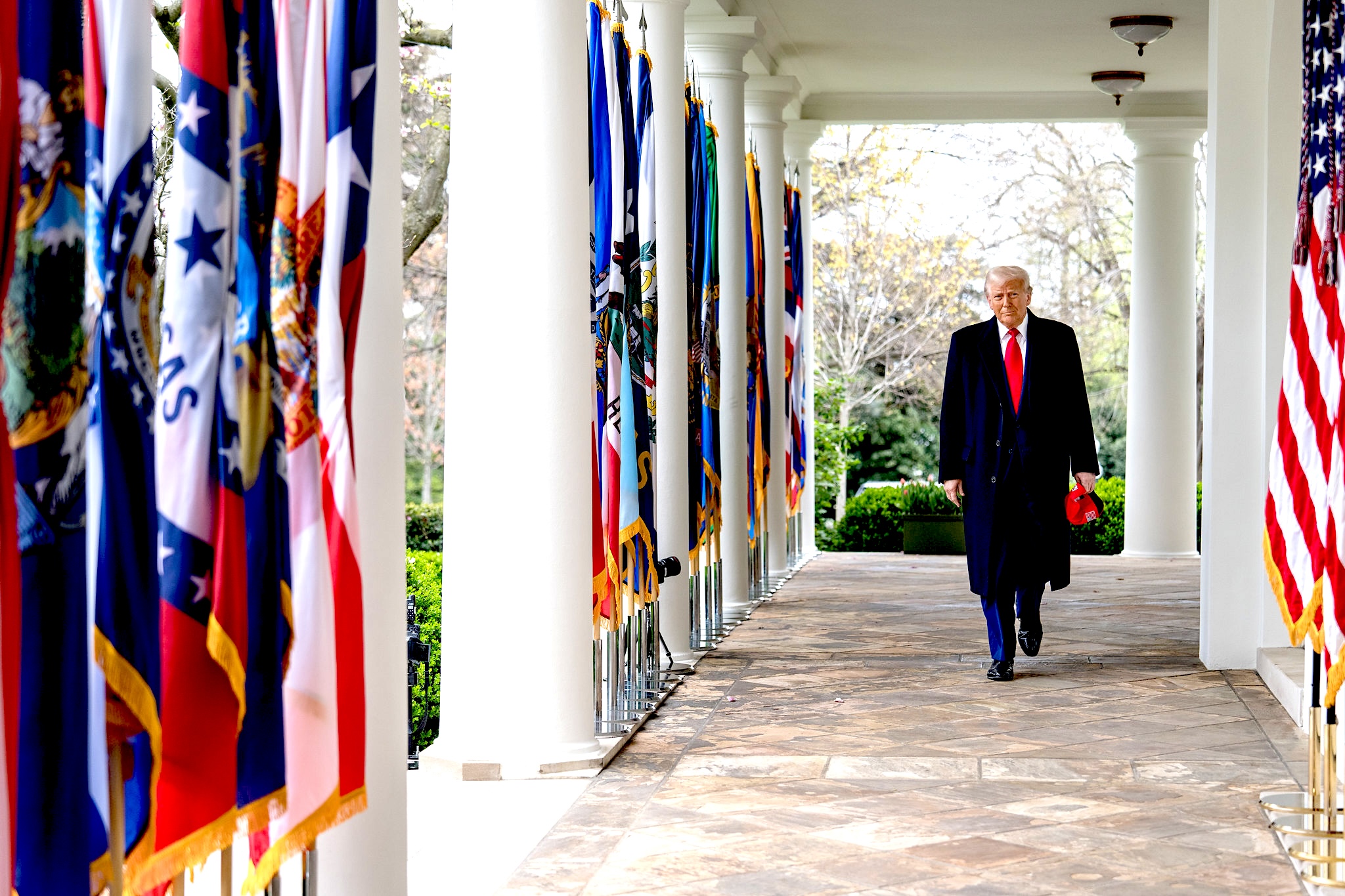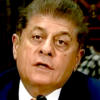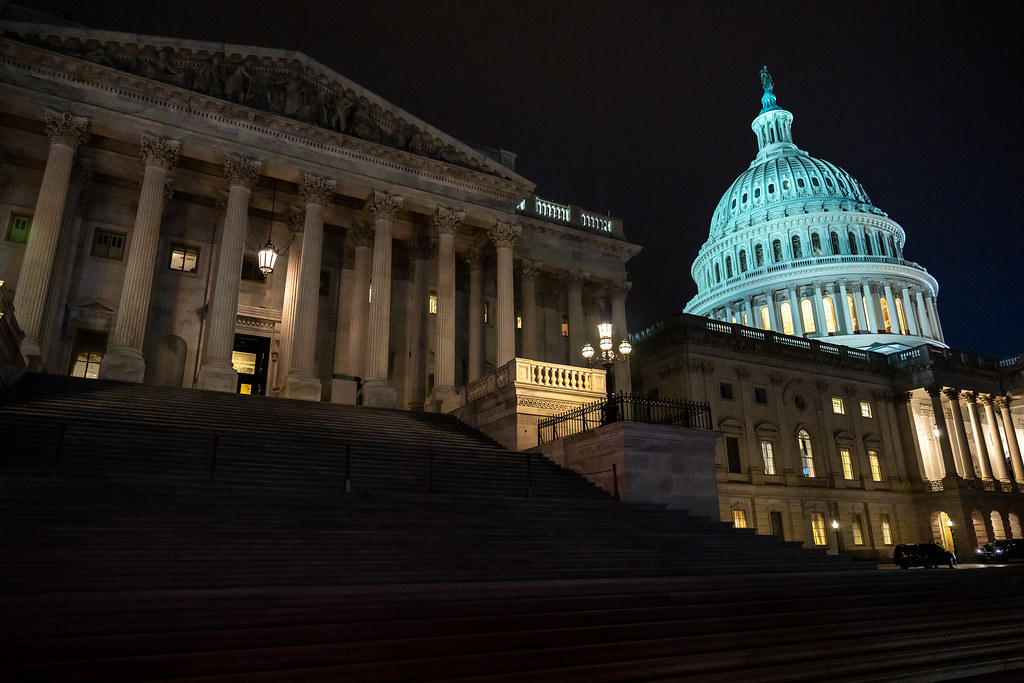No emergency means there is no lawful basis for Trump’s imposition of the tariffs, writes Andrew P. Napolitano. Nor is there any constitutional basis for the underlying statute.

President Donald Trump on his way to announcing his tariff plans on April 2 in the White House Rose Garden. (White House/Abe McNatt)
“No doctrine involving more pernicious consequences was ever invented by the wit of man than that any of [the Constitution’s] provisions can be suspended during any of the great exigencies of government.” — Ex Parte Milligan, Supreme Court of the United States, 1866.
 President Donald Trump recently imposed a national sales tax on nearly all goods emanating from outside the United States to be paid by the ultimate consumer. [On Wednesday, Trump temporarily lowered tariffs on most countries, but not China.]
President Donald Trump recently imposed a national sales tax on nearly all goods emanating from outside the United States to be paid by the ultimate consumer. [On Wednesday, Trump temporarily lowered tariffs on most countries, but not China.]
Thus, if you buy a Ford pickup truck in the U.S., because it contains parts from Canada, Mexico and South Korea, according to The Wall Street Journal, it will cost you an additional $3,000. The $3,000 was initially paid piecemeal by the foreign exporters of the parts to the U.S. Treasury as a condition for the parts entering the United States. When you pay the local Ford dealer, you are actually reimbursing the foreign exporters.
The same is the case for a toaster made in China. Last week, that toaster cost $25. Next week, it will cost $37.50, or, if Trump follows through on a threat made earlier this week, $50. If your budget for the toaster is $25 to $30, you probably won’t spend $50. If you do, you will be reimbursing the Chinese exporters for the 100-percent tariff that they already paid to the U.S. Treasury. Or, you will search in vain for an American-made toaster.
These sales taxes were added to the price of the Ford Pickup and the toaster not by an act of Congress, but by an act of the president alone. Can the president alone impose taxes on the American people? The short answer is: NO.
Here is the backstory.
Emergency Powers Act
In 1977, Congress enacted the International Economic Emergency Powers Act. This law permitted the president to impose tariffs on goods emanating from outside the U.S. in the case of an economic emergency. The statute defined an emergency as a sudden and unexpected event that adversely affects U.S. national security or economic prosperity.
Cognizant of the “emergency” trigger for the exercise of this unique power, the Trump administration initially offered that the introduction of fentanyl into the U.S. by foreign persons was the emergency. When advisers related to the president that the tariffs he contemplated would affect dozens of foreign countries producing hundreds of goods and services as to which there is no connection to fentanyl, the administration claimed the U.S. imbalance of trade as the emergency trigger.
The imbalance of trade means that persons and businesses in the U.S. spend more money on the goods and services that they buy from foreign sellers than they receive from sales of goods and services to foreign buyers. The executive order signed last week by Trump reflects that the U.S. has experienced this trade imbalance since 1934! Thus, by definition, it is not a sudden or unexpected event, and thus, it is not an emergency as defined in the statute.
No emergency means there is no lawful basis for Trump’s imposition of the tariffs.
There is also no constitutional basis for the statute. The Constitution reposes the power to tax exclusively into the hands of Congress. The Framers were so determined to keep that power there that they even required in the Constitution that all taxes emanate in the House of Representatives. Since this Trump sales tax emanated in the White House, it violates the Constitution.
Can Congress give the power to tax to the president? In a word: NO.

U.S. Capitol. (White House/Adam Schultz)
Congress cannot give away any of its core functions — among which is the power to tax. James Madison, who was the scrivener at the Constitutional Convention in 1787 and, during his lifetime, its most authentic interpreter of what the Framers’ original understanding of the document was, argued that the separation of powers — the Congress sets taxes, the president collects them — was written to preserve personal freedom by preventing the accumulation of too much power in any one of the three branches.
His argument was followed 200 years later by the late Justice Antonin Scalia, who wrote that delegated core powers cannot be redelegated to another branch.
The Anti-Democratic Branch
This is an example of why we have a life-tenured and unelected judiciary. It is the anti-democratic branch of government. Its duty is not to reflect the will of the voters, rather to protect their lives, liberties and properties from the popular branches when either of them exceeds the powers granted by the Constitution or tampers with its structure.
Congress can no more allow the president to impose taxes than he can allow the judiciary to command troops in wartime.
But here we are with a pliant Congress, one of whose predecessors gave away limited taxing power to the president, and a president heedless of the Constitution he has sworn to uphold and the federal laws he has sworn to enforce. Can Congress impose tariffs? Of course it can, and it did so as the primary revenue source for the federal government until the War Between the States.
The constitutional trouble comes, however, when presidents argue that it’s time to employ the emergency doctrine. As the Supreme Court has made clear, there is no emergency doctrine. But presidents from John Adams to Donald Trump have argued that “emergency” enhances their powers, and they have argued that they can determine when an emergency arises. This is a trick used by tyrants throughout history.
Congress has defined emergency. It is the duty of the Congress to rein in its wrongful use. This is not a pro-Trump or anti-Trump issue; nor is it a Republican or Democratic issue. It is one of fidelity to the supreme law of the land and to the laws written pursuant to it.
For without that fidelity, we have no democracy, just rule by the contemporary whims of whomever is in the government. One of the complaints that the colonists had about the British Parliament was taxation without representation. Good God, are we back to that?
Andrew P. Napolitano, a former judge of the Superior Court of New Jersey, was the senior judicial analyst at Fox News Channel and hosts the podcast Judging Freedom. Judge Napolitano has written seven books on the U.S. Constitution. The most recent is Suicide Pact: The Radical Expansion of Presidential Powers and the Lethal Threat to American Liberty. To learn more about Judge Andrew Napolitano, visit here.
Published by permission of the author.
COPYRIGHT 2025 ANDREW P. NAPOLITANO
DISTRIBUTED BY CREATORS.COM
The views expressed are solely those of the author and may or may not reflect those of Consortium News.

While the main point of this article is important- regarding the constitutionality of who can impose tariffs and taxes, unfortunately the author gets it wrong about who a pays the the tariff, not ultimately, but initially. It is not the foreign exporters who pay the tariff, but the domestic importer of the foreign goods. Why do so many people get this fact wrong? Also goods are really only part of the equation. If you include goods and SERVICES then the USA has a surplus with many countries. Surpluses and deficits are not inherently bad. I have a deficit with my grocery store but a surplus with my employer and these are fine.
Some might find it economically naive to suggest Islamic law prohibiting usury (the illegal action or practice of lending money at unreasonably high rates of interest) as the primary root cause of bellicose war talk directed at Iran, and the predominant Chinese state-owned public banking system as the prime root cause of belligerent war talk directed at China. A sober re-examination and re-assessment might change the minds of people who eschew or dismiss as “too simplistic” the previous explanation regarding the root causes of dangerous animosity directed toward these two nations.
Struggling working class American citizens should be somewhat conflicted about all this.
I hate the idea that Washington’s beating up on China, it’s nothing but dangerous and simply kicks the can down the road to the burgeoning multipolar world of which China will inevitably be a peaceful co-leader with myriad other nations. Anything that gets us away from Washington-militarist world hegemony is obviously beneficial.
It was Wall St and the Fortune 500 that moved all of our good manufacturing jobs abroad, NOT China. Having acknowledged this, I see nothing wrong with some targeted tariffs meant to help the American working class. After all, just about every nation-state on earth utilizes tariffs. The fledgling US industrial base never would have developed sans tariffs.
Our parasitic financial elite is to blame, not China or anyone else.
Your comment sidesteps, or seems to ignore, the basic point, the subject, of Judge Napolitano’s article, which is the CONSTITUTIONALITY of Trump’s imposing tariffs in a non-emergency situation.
Judges, law school professors and attorneys can constitutionally justify almost any policy or law. The rule of law is typically based on the tenor of the times.
Well, I wondered how this was possible.
But in the mainstream media I have not heard any such questioning.
It raises a number of questions such as whether Trump will seek a third term too.
We have also seen this with regard to the withdrawal from treaties that have been ratified by the Senate. But again, the constitutional question is not raised.
Are we back to “taxation without representation”? Yes, Judge Napolitano, you are, and in difficult times too.
The US judiciary will need quite some backbone to mediate executive and legislative behavior as the empire is forced to receed.
Former Judge Napolitano is rhetorically persuasive in his arguments with respect to constitutional issues. But our Constitution has all too often proved chimerical, contradictory, and ignored in the name of some sort of “organic” aspect as to which its framers were most likely oblivious. Hence, no surprise there. But it is not only our Constitution that is being tortured, so are essential elements of the United Nations Charter and diverse international agreements that the United States itself imposed on the world which make economic warfare anathema. That the United States violates those as easily as it violates its own founding documents, and has always done so, ought not to surprise us although they are abhorrent.
Analysis of the traditional nature and consequences of tariffs is essential to understand what is occurring and what Mr. Trump is really after. As Mr. Napolitano note, domestic consumers, in the end, pay the tariffs imposed on foreign exports, the goal usually being either to raise income or more frequently to dissuade domestic purchasers from buying foreign goods and opting instead for comparable domestic products. Of course, the likelihood is overwhelming that domestic producers will raise their prices as much as they can, while retaining a competitive price advantage, and that, in either case, domestic consumers will be worse off, although domestic producers will reap benefits primarily allocated among their stockholders, lenders and senior executives. Mr. Trump, on the other hand, seems to have two very different goals in mind. One is, as he says, to balance the playing field with respect to international trade. I understood years ago from people close to him in his youth that his ultimate goal was to attain tariff free trade on a global basis, which does not address the issue of subsidies that have impact similar to tariffs and which the United States and other countries frequently use. The second goal is more complex. It is to use tariffs as weapons to destroy competing economies and also, non-subservient foreign governments, something the United States does regularly with tariffs and other economic weapons of choice such as embargoes, boycotts, denial of access to international financial logistics and fines (just ask Cuba, Venezuela and Nicaragua in our own hemisphere), and those tactics have been used since the Second World War on a bipartisan basis, probably unconstitutionally and in contravention of international law. Thus, the issues identified by former Judge Napolitano are hardly novel, albeit certainly as serious as he now perceives them to be.
re “other economic weapons of choice such as embargoes, boycotts, denial of access to international financial logistics and fines (just ask Cuba, Venezuela and Nicaragua in our own hemisphere),”
Oddly, Mr. Mahe does not mention the use of sanctions on Russia to try to bring that country to heel and destroy its economy.
I think one thing that’s not getting a lot of attention is that we owe China a great deal of money. The tariff thing is certainly a way to project Trump’s “power” in order to show other nations how easily he can damaged their economies as a sort of extortion, and certainly it’s clear that the on again/off again tariffs have served as manipulations allowing his friends to do some very profitable insider trading- Strong motives, certainly. I have also recently heard members of his administration and others beginning to refer to the tariff thing as “shock treatment” which raises the question as to whether are we being subjected to a bit of Chicago Boys style economic “readjustment” that in the past has worked wonders with the consolidation of power after a coup-the initial chaos and inflation along with destruction of public institutions and of course, tanks and secret police(we have everything but the tanks currently). However; looking back at his business practices in Manhattan, I think Trump actually thinks that he will get the Chinese to take a “haircut” (to use his words). I’m guessing he hopes to either default on the trillions we owe China or somehow force the Chinese to forgive a lot of that dept. He and his people are pretty delusional. Loved that Chinese government spokesman that said the other day that “China has been here for 5000 years and America 250-we will be here for another 5000.” I don’t expect there to be a human race in 5000 years but I still think Trump seriously underestimates China.
The point that I think people are missing in this tariff business is that a tax is paid to the US by the seller. That tax goes into government coffers. However, ultimately, the consumer pays that tariff. Meanwhile the tariff tax which is collected by and banked by the US government constitutes funds available for general use. That use is earmarked for tax cuts for the wealthy. This is the essence of the tariff scam.
I don’t get it, maybe it’s because I’m Canadian but I was always told the US political system had all these wonderful checks and balances on the potential abuse of power. This, allegedly, made the US system “more democratic” than our parliamentary system in Canada. Yet, here we are with a President abusing powers left, right and centre and there seems to be nothing anyone can do about it? I thought the military’s first allegiance was to the constitution not the President? Can someone help me out here?
The ultimate control of governance in true democracy and representative democracy is the people through their selection of policy or representatives to determine policy. The US no longer has an informed, competent electorate; the people have allowed themselves to be abused; there are lots of bad actors misinforming and scheming, but finally it is only the people who can force changes: that is where the responsibility always finally must rest.
Without an informed, vigilant and engaged electorate ‘democracies’ are always susceptible to tyranny.